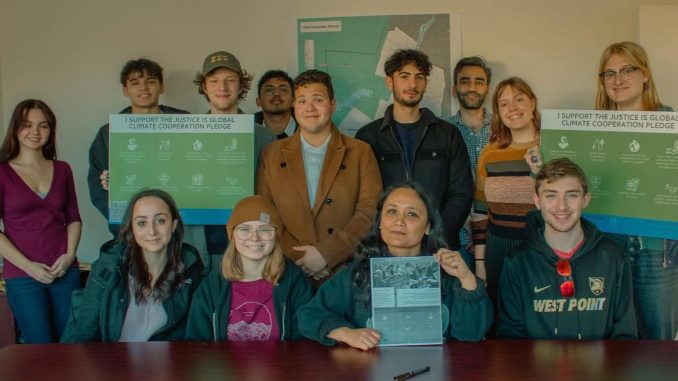
Do you want to explore the reach of climate change with a focus on its effects in places other than the United States? Have you thought about engaging in politics to have an impact on a local and global level? If you answered “yes” to any of these, then look no further than SUNY New Paltz’s chapter of Justice is Global, which recently gained recognition as an official club on campus.
Justice is Global, or JiG for short, is a grassroots progressive movement based in New York, formed in 2015 by organizers, academics and faith leaders with a focus on promoting a sustainable global economy and addressing problems shared across borders.
According to the New Paltz chapter’s president Inka Urra Bodnar, political science and international relations professor Stephen Pampinella was “initially the driving force of JiG’s campus formation.”
“It [JiG] focuses on environmentalism and climate change from the perspective of the Global South — not the perspective of the Global North and countries on the profiting side of capitalism,” said Sage Frank, the social media coordinator of JiG.
“The main goal of the organization is to promote multilateralism, progressive climate change and global cooperation between specifically the U.S. and China, as these countries’ constant economic competition only further worsens the reality of climate change policy in countries that the U.S. and China are profiting economically from — in Latin America, the Caribbean, Africa and South Asia.”
Some of JiG’s past events include hosting a teach-in on COP 28 — the United Nations Climate Change conference — canvassing for progressive New York State Assemblywoman Sarahana Shrestha (D–Esopus) and signing a Global Climate Cooperation pledge with her, collaborating with Multicultural United Students Empowered (M.U.S.E.) and organizing to attend the March to End Fossil Fuels in New York.
The pledge Assemblywoman Shrestha signed was the Global Climate Cooperation pledge, which “demands diplomacy when engaging in global problems, a workers-first clean economy, sharing of renewable energy technology with other countries, funding the transition to green economies in low-middle income countries, canceling global debts, supporting climate refugees, democratizing energy production and deescalating military conflicts,” according to Urra Bodnar.
“We want to use our platform to create an intersectional space for people to engage with international, environmental and local politics. There aren’t many activist clubs on campus that provide students with the flexibility to address and engage with international issues,” she added.
“There weren’t even many spaces for students who are affected by these issues to be supported. For me, as a Ukrainian-Hispanic first generation immigrant, it was really important to find a community that actively strives to be educated on and bring awareness to human rights issues around the world.”
JiG meets every Tuesday at 6:30 p.m. in Humanities 312. To stay up-to-date with JiG’s events, you can follow them on Instagram @justiceisglobal.np
